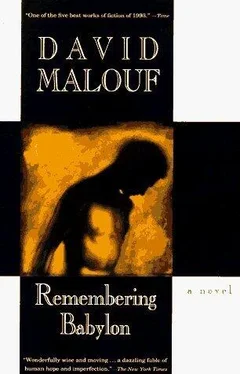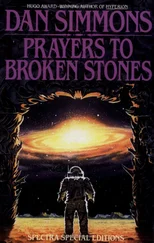The flies returned. They climbed over one another’s backs in their eagerness to feed and wallow. He felt maddened that such creatures should exist in the world, and would have rushed once again to smash them. But what had they to do with it? Some man had done this. That was the real abomination. Someone he knew. Someone whose eyes he had looked into, and recently; maybe at the very moment when he was planning the thing. That fellow had squatted here, somewhere here — he swung about again as if he might catch the glimpse of a retreating shirt-tail — and with a grunt of satisfaction squeezed this filth out of himself, fouled his own hand with it, and spread it as an insult between them, made public and stinking in the sun. He saw the hand with its load of filth moving across the wall and understood now that what it was setting there was a word. What word? He shook his head wildly to prevent it forming, to prevent the possibility of it getting in there, of himself giving it form, and was glad that the only other man who had seen it was Gemmy, who could not read. To have that word in his head, where it could never be scrubbed out, would be madness to him. Even now –
He got to his feet and went swiftly to the creek, his breath racking him like a wounded animal’s, and stumbled into the smooth and liquid light (it was the same spot where he had seen his bird), and scrubbed his hands, and would have stripped and scrubbed his whole body, but discovered that he had no belief any longer in the water’s power to cleanse.
What horrified him was that he might find himself face to face with the man whose smell he had on his hands, in his head too, a thing so intimate, so personal, that surely he would recognise it on the man himself, and the word would leap up in the air between them, taking form from the stench. He swung about again. And it seemed to him now that it was the sky that had been smeared, the earth, the water. The word was on them; some old darkness out of the depth of things was scribbled there for ever, and could never now be eradicated.
ANDY MCKILLOP’S visionary powers were greater than he knew. The blacks had brought Gemmy something, though it wasn’t a stone.
When all the proper formalities had been exchanged, and the necessary questions asked and answered, the silence between them as they sat, all three, and faced one another, became a conversation of another kind; and the space between them, three feet of baked earth where ants in their other life scurried about carrying bits of bark and other broken stuff in the excited scent of a new and foreign presence, expanded and became the tract of land up there under the flight of air and the stars of the night sky, that was the tribe’s home territory, with its pools and creeks and underground sources of water, its rock ridges and scrub, its edible fruits and berries and flocks of birds and other creatures, all alive in their names and the stories that contained their spirit, for a man to walk into and print with the spirit of his feet and the invisible impact of his breath.
For longer, much longer, than the ten minutes Andy McKillop counted from his side of the hill, they moved together through its known places. And Gemmy — as he recognised one and then another feature of it, the site of old happenings, strange encounters, or stories, or lean feasts — felt the energy flow back into him, and saw, in the sudden access of it, how weak he had grown in these last months, with the dry little cough that plagued him, and his stomach troubles.
The air he breathed here did him no good, the food too. The ground he walked on jarred at every step. The land up there was his mother, the only one he had ever known. It belonged to him as he did to it; not by birth but by second birth, by gift, and not just for his lifetime either but for the whole of time, since it was for the whole of time that it existed, as he did too so long as he was one with it. This was what the blacks had brought him, in case he needed it. They were concerned that in coming here, among these ghostly white creatures, he might have slipped back into the thinner world of wraiths and demons that he had escaped, though never completely, in his days with them. They had come to reclaim him; but lightly, bringing what would feed his spirit.
They spread the land out for him, gave him its waters to drink. As he took huge draughts of it, saw it light his flesh. Watched him, laughing, bathe in it, scooping great handfuls over his breast. In the little space of dust between them as they sat, they danced, beat up clouds, threw rainbows over their heads. Then they rose, exchanged the formalities of parting, and went. A day and a night it would take them to reach a place that was already humming all round him as he took up his hammer and sent the blows of it leaping with such clarity in the release of his spirit that they might be flying, he thought, thirty miles off, like stars his arms could fling over the furthest ridge to light their path.
Then that bloke Andy appeared; came stumbling out of the scrub with his crooked jaw and restless, runaway eyes, and stood leaning on air, with the odd, empty look that anything, any madness might fill; hinting, demanding. The air around him was immediately infected, sucked into the emptiness he made just by stepping into it. Gemmy felt the good health that had been given him weaken. As if he had looked into a pool — that was how this Andy affected him — and seen an image of himself that was all unfocused pieces that would not fit.
With an effort he pulled his eyes away, and the man, or the furious emptiness rather that wore a look and held a shotgun and was trying to find the shape of a man, went still and vanished.
It was the kind he was, this Andy. If you refused him your attention he mumbled, dithered, boiled with his own hopeless impotence, and disappeared.
But when, with a hiss, he did turn on his heel at last and stalk away, Gemmy felt his heart fall. He was real enough; the emptiness was real. And they stood too close to one another on the lowest rung of things in the settlement for his ferocity to accept defeat.
Slowly, over the months, he had learned how to handle such fellows. He stepped into their skin, looked about quickly, stepped out again, then dealt with them as they dealt with themselves.
One or two of them knew this and kept clear. They did not care to be exposed, even to themselves. Others felt it but did not know, and the less they knew the more openly hostile they grew; these were the ones you had to watch out for. He watched, allowing himself no illusions, and since there was a kind of agreement among them, or so it seemed, that open savagery was not permitted, he survived.
He had no real tormentors here. Even the crudest among them affected a bantering tone — though he soon saw through it — as if any mischief they might get up to was an expression of an irresistible jollity, and when it went too far, and he was roughly used, the fault, if anyone’s, was his. They got him to his feet, brushed him down, told him he wasn’t hurt, that he was a good fellow and that they had meant no harm. (It was true. They thought they didn’t.)
His real tormentors were in his head, and they came after him more and more often now as their shapes rose clearer in his memory and grew faces and fists in the dark hours of his sleep. And as always, it was Mosey and The Irish who were the worst of them: Mosey with his high thin voice and fair wisp of a beard, soft as a girl, and The Irish with gunpowder pits in his cheeks and two fingers gone from his right hand.
‘What have we got here, now? A boy, is it? By Jimminy yes, I reckon it’s a boy, a boyo. But what a scrawny, thin-necked, weasel of a boy,’ and with each new taunt they would begin to push him back and forth between them, ‘what a snub-nosed —’
Читать дальше












